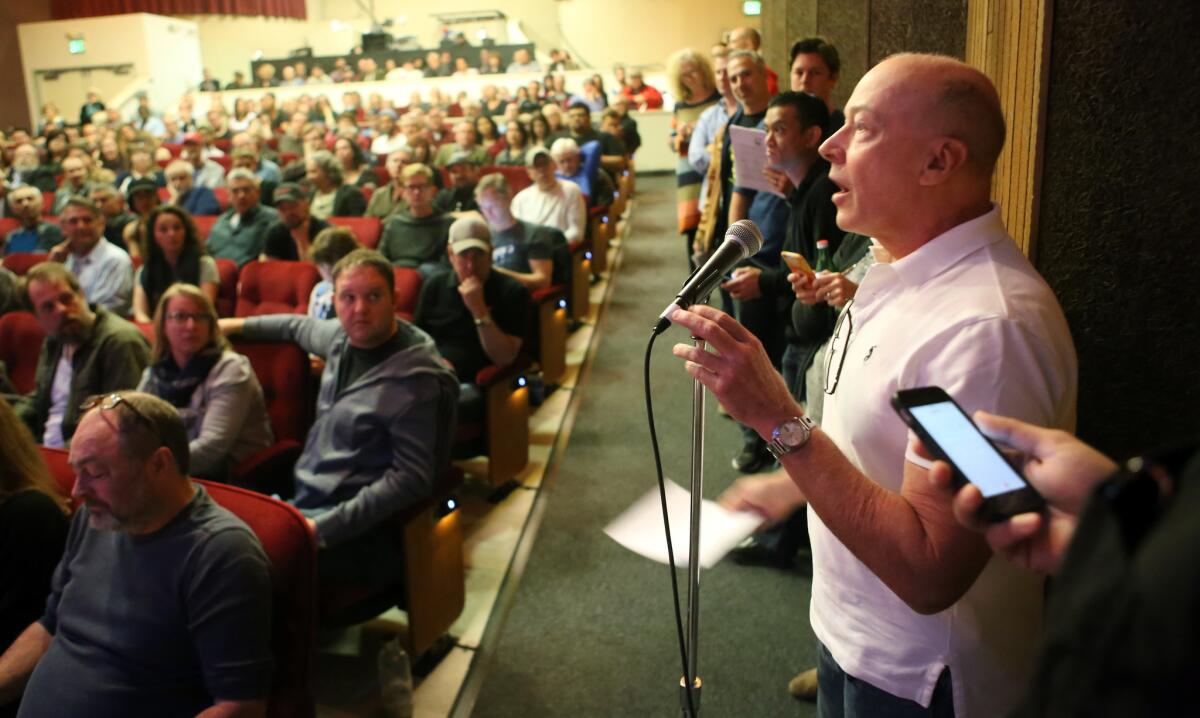L.A. County’s small-theater community speaks out on proposed wage hike

- Share via
An impassioned, two-hour, open-mike meeting about the future of Los Angeles County’s small-theater community Saturday at the Renberg Theatre at the Los Angeles LGBT Center in Hollywood drew an overflow crowd of well over 200 theater folks.
With just one exception, the dozens of speakers, including a calmly emphatic Tim Robbins, were motivated by a deep fear of what a proposed higher wage might do to their artistic scene.
Actors’ Equity, the national union for stage actors, is seriously considering imposing a $9 hourly minimum wage for its members when they perform or rehearse in L.A.’s small venues.
Sign up to receive our Essential Arts & Culture Newsletter
Robbins and the rest think $9 an hour is exorbitant and that actors should continue working on small stages for what they have been receiving for decades. The going rate is $7 to $15 per performance, depending on ticket prices and seating capacities. Rehearsals, which can consume scores of hours, pay nothing.
Many L.A. theater people believe a minimum wage will kill some small companies and suck variety out of the scene. They fear it will make shows with large casts cost-prohibitive and dissuade producers from putting on risky or unorthodox plays that don’t have a ready-made audience. Most of the small theaters are nonprofit organizations that need donations to augment ticket sales in order to sustain what’s typically a hand-to-mouth existence.
The New York-based union’s 81-member governing council is poised to vote April 21 on whether to require the $9-an-hour wage; 20 of the voters are from L.A.
Mary McColl, national executive director of Actors’ Equity, thinks that L.A.’s small theater scene can do better.
She sees a $9 wage as a way to improve actors’ lives while concentrating producers’ minds on how to grow companies instead of staying with a status quo she says is unique in the nation. She wasn’t at the meeting Saturday, and if any union leaders were, they didn’t make themselves known.
In an interview, McColl said the union wants to play a bigger part in improving the Los Angeles theater scene and is willing to help with fundraising.
Robbins isn’t buying it. He’s the founder and artistic director of the Actors’ Gang in Culver City, launched before his 1988 ascent to movie stardom in “Bull Durham.”
He stepped to a microphone wearing a pale blue denim jacket and said it made no sense for union officers to expect small theaters to survive under the proposed new terms. Even with volunteer labor from actors, Robbins began, “I’ve lost hundreds and hundreds of thousands of dollars. I should rephrase that — invested [it].”
The Actors’ Gang has often done shows with big casts, developing new plays from scratch in lengthy rehearsal processes. Some have toured nationally and overseas — where real wages kicked in.
“I’ve gotten so much out of it, and so have the actors,” Robbins said. “Actors have launched careers.” The Actors’ Gang would have died in the cradle, he said, had there been a minimum wage rule when it began.
“I would urge you all to vote no,” Robbins said. He was referring to balloting that starts on March 25, when more than 6,000 members of Actors’ Equity in L.A. County will begin voting on the proposal online or by mail.
But the vote is only advisory. The Equity governing council has the authority to disregard a no vote and set new union rules prohibiting members from performing and rehearsing for less than $9 an hour.
Still, said actor-director Joel Swetow, a big no vote in the advisory balloting could make it politically impossible to force an unwanted wage hike. Before the meeting ended, Swetow was brandishing sheets for petition signatures, and plans were being hatched for a social media drive against the pay increase.
Ideas included enlisting L.A. elected officials to pressure union leaders, playing the celebrity card via campaign testimonials on YouTube, and if necessary drawing upon pro bono legal representation that producers league chairman Michael Seel said has been offered.
A running theme during the meeting was that the changes also would bring about a mainstreaming of the small theater repertoire that could take a particular toll on roles for non-whites.
Shaking with emotion and barbing his thoughts with expletives, actor Richard Azurdia spoke of how parts in small theaters have recharged him after jobs in film and television that pay well but force him to play Latino stereotypes.
“In 99-seat theater I do my best work,” he said. “It’s most fulfilling for me as an artist. But I will work less in this city” if the new plan goes through.
Not all the emotion was on the no side.
“I may be the only person in this room voting yes,” said Ann Colby Stocking. She said that she and some actor friends had in fact approached union leaders asking their help because they need better pay.
She painted the scenario she has seen actors endure: “They’ve come [to rehearsals] from working an eight-hour job. They’re crying from exhaustion, they’re fainting. They can’t take time off, because they can’t afford it.” With better pay, she suggested, the play could be the thing, the exhausting day job, less so.
Stocking was politely received, even applauded. But by the time the meeting broke up it looked as if a civil war were at hand and that, in an extreme rarity for the U.S. labor movement, a substantial force within a union was mobilizing against a pay hike.
Twitter: @boehmm
More to Read
The biggest entertainment stories
Get our big stories about Hollywood, film, television, music, arts, culture and more right in your inbox as soon as they publish.
You may occasionally receive promotional content from the Los Angeles Times.











